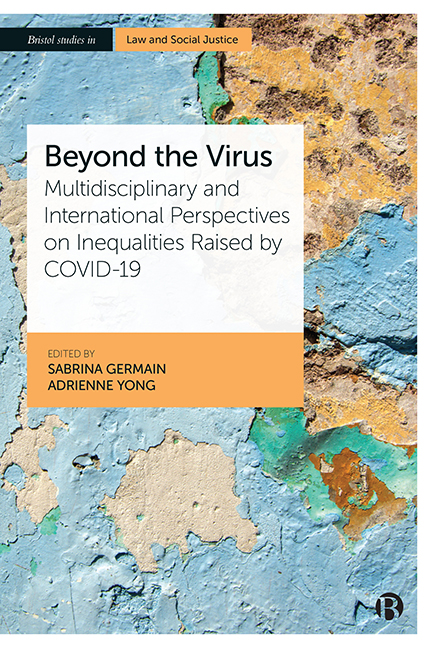 Beyond the Virus
Beyond the Virus 5 - Beyond COVID-19 Lockdown Compliance: A Gender Analysis
Published online by Cambridge University Press: 17 January 2024
Summary
Introduction
COVID-19 and the subsequent initiatives put in place to suppress the virus are predicted to have a negative impact on gender equality in both the immediate and medium-long term. There has already been a wealth of research that, on the one hand, points to women being more likely to endorse and be compliant with social distancing measures put in place to suppress the COVID-19 virus since late March 2020 (Galasso et al, 2020; Carreras et al, 2022). But on the other, there is also evidence of how the social distancing measures themselves are damaging for women. Namely, how nationwide ‘lockdowns’ have exacerbated existing gender disparities in caring, with women more likely to pick up home learning and caring to fill the gap of physically closed educational and childcare establishments, and with informal grandparental care strongly discouraged. Thus, the very social distancing measures that women endorse have impacted women negatively more than men, and have led to increased gender inequality, both intra-household and in the labour market, with women being more likely to have been made unemployed or furloughed (ONS, 2021; Wielgoszewska et al, 2021). Work has been undertaken to understand why women are more compliant than men. It suggests that dispositions that existed prior to the pandemic have increased COVID-19 compliance, such as women tending to be more rule-compliant (Tom and Granie 2011; Grosch and Rau 2016) or risk averse (Carreras et al 2022). It has also shown that COVID-19-specific factors explain women’s increased propensity to be COVID-19 compliant, such as women being more likely than men to see COVID-19 as a serious health problem (Galasso et al, 2020).
What these studies overlook, however, is how compliance to COVID-19 restrictions can actually be challenging for women, precisely because of their caring responsibilities, given that ‘the regulations and guidance assumed that households were separate units and ignored the interdependencies which exist between households and between individuals and wider society’ (Gulland, 2020: 329). Writing prior to the pandemic, Bowlby et al underscored the potential for ‘individual stress or societal stress’ to heavily disrupt existing caring arrangements (Bowlby et al, 2010: 1).
- Type
- Chapter
- Information
- Beyond the VirusMultidisciplinary and International Perspectives on Inequalities Raised by COVID-19, pp. 97 - 116Publisher: Bristol University PressPrint publication year: 2023
